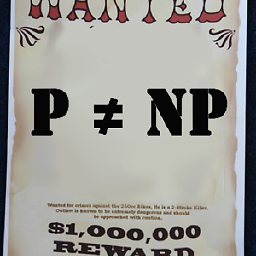Shuffle an array with python, randomize array item order with python
271,508
Solution 1
import random
random.shuffle(array)
Solution 2
import random
random.shuffle(array)
Solution 3
Alternative way to do this using sklearn
from sklearn.utils import shuffle
X=[1,2,3]
y = ['one', 'two', 'three']
X, y = shuffle(X, y, random_state=0)
print(X)
print(y)
Output:
[2, 1, 3]
['two', 'one', 'three']
Advantage: You can random multiple arrays simultaneously without disrupting the mapping. And 'random_state' can control the shuffling for reproducible behavior.
Solution 4
The other answers are the easiest, however it's a bit annoying that the random.shuffle method doesn't actually return anything - it just sorts the given list. If you want to chain calls or just be able to declare a shuffled array in one line you can do:
import random
def my_shuffle(array):
random.shuffle(array)
return array
Then you can do lines like:
for suit in my_shuffle(['hearts', 'spades', 'clubs', 'diamonds']):
Solution 5
Just in case you want a new array you can use sample:
import random
new_array = random.sample( array, len(array) )
Author by
davethegr8
Updated on July 08, 2022Comments
-
 davethegr8 4 months
davethegr8 4 monthsWhat's the easiest way to shuffle an array with python?
-
 John Y almost 11 yearsIt doesn't return anything specifically because it is trying to remind you that it works by altering the input in place. (This can save memory.) Your function alters its input in place also.
John Y almost 11 yearsIt doesn't return anything specifically because it is trying to remind you that it works by altering the input in place. (This can save memory.) Your function alters its input in place also. -
 Mark Rhodes almost 11 yearsI guess it's a style thing. Personally I prefer the fact that I can write a single line to achieve what would take a couple otherwise. It seems odd to me that a language which aims to allow programs to be as short as possible doesn't tend to return the passed object in these cases. Since it alters the input in place, you can replace a call to random.shuffle for a call to this version without issue.
Mark Rhodes almost 11 yearsI guess it's a style thing. Personally I prefer the fact that I can write a single line to achieve what would take a couple otherwise. It seems odd to me that a language which aims to allow programs to be as short as possible doesn't tend to return the passed object in these cases. Since it alters the input in place, you can replace a call to random.shuffle for a call to this version without issue. -
 John Y almost 11 yearsPython doesn't actually aim to be as brief as possible. Python aims to balance readability with expressivity. It so happens to be fairly brief, mainly because it is a very high-level language. Python's own built-ins typically (not always) strive to either be "functionlike" (return a value, but don't have side effects) or be "procedurelike" (operate via side effects, and don't return anything). This goes hand-in-hand with Python's quite strict distinction between statements and expressions.
John Y almost 11 yearsPython doesn't actually aim to be as brief as possible. Python aims to balance readability with expressivity. It so happens to be fairly brief, mainly because it is a very high-level language. Python's own built-ins typically (not always) strive to either be "functionlike" (return a value, but don't have side effects) or be "procedurelike" (operate via side effects, and don't return anything). This goes hand-in-hand with Python's quite strict distinction between statements and expressions. -
 Jabba over 10 yearsNice. I suggest renaming it to my_shuffle to see the difference in the code immediately.
Jabba over 10 yearsNice. I suggest renaming it to my_shuffle to see the difference in the code immediately. -
 Aaron Newton over 10 yearsMaybe, but this could be premature optimization (it could be helpful, but the need to shuffle doesn't explicitly require the need to return the array). Also, shuffle(array) followed by some use of shuffle would only be 2 lines as opposed to 3 + n (times usage), although I guess it would be a saving if you use it many times. Here is a great video that discusses this type of thing (e.g. phantom requirements and premature optimisation) - pyvideo.org/video/880/stop-writing-classes
Aaron Newton over 10 yearsMaybe, but this could be premature optimization (it could be helpful, but the need to shuffle doesn't explicitly require the need to return the array). Also, shuffle(array) followed by some use of shuffle would only be 2 lines as opposed to 3 + n (times usage), although I guess it would be a saving if you use it many times. Here is a great video that discusses this type of thing (e.g. phantom requirements and premature optimisation) - pyvideo.org/video/880/stop-writing-classes -
 abcd over 6 yearswhat does destroyed mean, exactly? (i mean, in this context -- i'm not an ELL.)
abcd over 6 yearswhat does destroyed mean, exactly? (i mean, in this context -- i'm not an ELL.) -
user781903 almost 6 yearsyes it returns None, but array is modifed, if you really want to return something then do this import random def shuffle(arr): random.shuffle(arr) return arr
-
 Charlie Parker over 5 yearsis there an option that doesn't mutate the original array but return a new shuffled array?
Charlie Parker over 5 yearsis there an option that doesn't mutate the original array but return a new shuffled array? -
 Charlie Parker over 5 yearsis there an option that doesn't mutate the original array but return a new shuffled array?
Charlie Parker over 5 yearsis there an option that doesn't mutate the original array but return a new shuffled array? -
 David Z over 5 years@Charlie That would be a good thing to ask in a separate question. (Maybe someone else has already asked it.)
David Z over 5 years@Charlie That would be a good thing to ask in a separate question. (Maybe someone else has already asked it.) -
Nicholas McCarthy over 5 yearsWell if I try A = np.array(range(9)).reshape([3,3])
-
 Dmitry almost 5 yearsThanks, it's very useful to shuffle two arrays at once.
Dmitry almost 5 yearsThanks, it's very useful to shuffle two arrays at once. -
nOp over 4 yearsWas looking for this, TNX!
-
 Joshua Huber over 4 yearsIronically enough, this page is the top hit in Google when I just searched for "python shuffle array"
Joshua Huber over 4 yearsIronically enough, this page is the top hit in Google when I just searched for "python shuffle array" -
 Matt over 4 years@Charlie people Google these questions so they can find answers to them on places like stack overflow. As long as it's not a duplicate there's nothing wrong with making stack overflow an option as a resource
Matt over 4 years@Charlie people Google these questions so they can find answers to them on places like stack overflow. As long as it's not a duplicate there's nothing wrong with making stack overflow an option as a resource -
 WestCoastProjects about 4 yearsthis is more complete (and often more useful) than the accepted answer
WestCoastProjects about 4 yearsthis is more complete (and often more useful) than the accepted answer -
 WestCoastProjects about 4 yearsdoes this create a new random element for each element of the array?
WestCoastProjects about 4 yearsdoes this create a new random element for each element of the array? -
 James about 4 years@javadba No, this just sort an array by random index which will end up shuffle the array
James about 4 years@javadba No, this just sort an array by random index which will end up shuffle the array -
 WestCoastProjects about 4 yearsSorry i was maybe not clear I did not mean the
WestCoastProjects about 4 yearsSorry i was maybe not clear I did not mean thearrayI meant theRandomelement: ie in thelambdatherandom.random()might be generating newRandomclass instance each time. I'm not actually sure: injavathis would be the wrong way to do it: you should create aRandom rng = Random()and then invoke therng.nextGaussian(). But not sure how pythonrandom.random()works -
 LuFFy about 4 yearsWhile your code may correct as answer But Elaborating what your code does, It can improve the quality of your answer. Checkout the Article : How do I write a good answer?
LuFFy about 4 yearsWhile your code may correct as answer But Elaborating what your code does, It can improve the quality of your answer. Checkout the Article : How do I write a good answer? -
Bobby Zandavi over 2 years@{Charlie Parker} Just make a copy of the original array before using random.shuffle: ` copy_of array = array.copy() random.shuffle(copy_of_array) `
-
 James Parker about 2 years@CharlieParker
James Parker about 2 years@CharlieParkernew_array = list(array); random.shuffle(new_array) -
 Charlie Parker about 2 yearsfor those that don't conceptually see what
Charlie Parker about 2 yearsfor those that don't conceptually see whatnew_array = list(array); random.shuffle(new_array)does since they are not commands on separate lines. James is first creating a copy and then shuffling the array. -
allenh over 1 year@CharlieParker From the python docs
shuffled = sample(array, k=len(array)) -
Amin Pial over 1 yearfor example, you are building an exe or packing your code. Then just to shuffle an array you have to package the whole
sklearnin your package!!!. which is not sane. Something works don't mean it is the correct solution. The answer is more of a hack rather than a solution. -
Tushar Kshirsagar about 1 yearout put is none for a4 = np.array((blockshaped(c, 2, 3)))[3] where blockshaped return nd'array
-
 David Z about 1 year@Tushar Despite the name, the object you get from
David Z about 1 year@Tushar Despite the name, the object you get fromnp.array()is not an "array" in the sense of this question. You may want to look for another question to find out how to shuffle a Numpy array specifically. (Or you can search the web to find the right page in the Numpy documentation.)